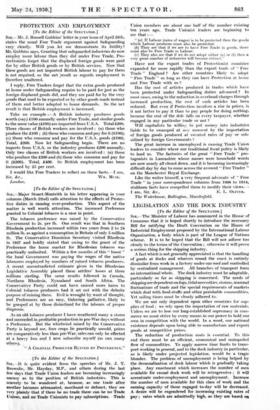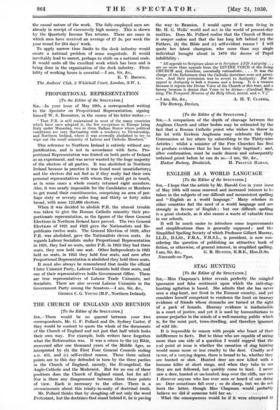LEGISLATION AND THE DOCK INDUSTRY [To the Editor of the
SPECTATOR.] SIR,—The Minister of Labour has announced in the House of Commons that it is hoped shortly to introduce the necessary Bill for ratifying the Draft Convention on the Hours of Industrial Employment proposed by the International Labour Organization, a body which is part 'of the League of Nations
scheme. It is to be hoped that the will hot. adhere too closely to the terms of the Convention ; otherwise it will prove a serious thing for the shipping industry.
A fact which is not generally appreciated is that the handling of goods at docks and wharves round- the coast is entirely dissimilar from work in a factory udder one roof and controlled by centraliied management. All branches 'of transport form an international whole. The dock industry must be adaptable, particularly so far as shipping is concerned. The needs of shipping are dependent onfogs, tidal necessities, storms, seasonal fluctuations of trade and the special requirements of markets which deal with food-stuffs and other perishable commodities. Yet sailing times must be closely adhered to.-
We are not only dependent upon other countries for sup- plies of food ; we rely upon the importation of raw materials. Unless we are to lose our long-established supremacy in com- merce we must strive by every means in our power to hold our own in competition with the world. In a word,- our national existence depends upon being able to manufacture and export goods at competitive prices. •
The reduction of production costs is essential. To this end there must be an efficient, economical and unimpeded flow of commodities. To apply narrow time limits to trans- port working in general, and to the dock industry in particular, as is likely under projected legislation, would be a tragic blunder. The problem of unemployment is being helped by the decasualization of dock labour which is gradually taking place. Any enactment which increases the number of men available. for casual dock work will be retrogressive ; it will accentuate under-employment and unemployment. Increase the number of men available for this class of work and the earning capacity of those engaged to-day will be decreased. A desire will be engendered for . increasing existing rates of par; rates which- are -admittedly high, as they are based. on
the casual nature of the work. The fully-employed men are already in receipt of excessively high money. This is shown by the Quarterly Income Tax returns. There are cases in which men have received an average- of £7 5s. per week the year round for 284 days' work.
To apply narrow time limits to the dock industry would create a national problem of some magnitude. It would inevitably lead to unrest, perhaps to strife on a national scale. It would undo all the excellent work which has been and is being done in the organization of the dock industry. Flexi- bility of working hours is essential.—I am, Sir, &c.,







































 Previous page
Previous page